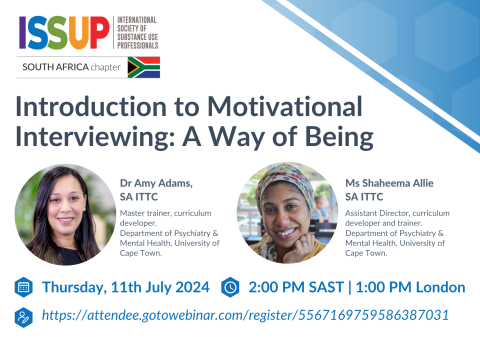ISSUP South Africa cordially invites you to join its upcoming webinar on Introduction to Motivational Interviewing: A way of being.
Time: 2PM SAST | 1PM London
The webinar discusses the use of Motivational Interviewing as an evidence-based component of psychological intervention packages for the treatment of harmful substance use and substance use disorders. The discussions will focus on :
Introduction to Motivational Interviewing:
- What is Motivational Interviewing?
- The Spirit of Motivational Interviewing
5 Principles of Motivational Interviewing:
- A description of the principles of Motivational Interviewing, i.e. express empathy, develop discrepancy, avoid argumentation, roll with resistance and supporting self-efficacy.
Counselling skills in Motivational Interviewing: OARS
- Brief description of the counselling skills used in Motivational Interviewing: open-ended questions, affirmations, reflections, summaries (OARS)
- Strategies to elicit/strengthen motivation for change.
Intended audience:
- SUD treatment practitioners and also applicable to other health practitioners involved in interventions geared towards behaviour change.
Learning outcomes:
-
To understand the spirit of Motivational Interviewing.
-
Gain knowledge of basic principles of Motivational Interviewing.
-
Improved awareness of basic counselling skills in Motivational Interviewing (OARS) and basic intervention strategies in Motivational Interviewing.
-
To understand how Motivational Interviewing as an evidence-based intervention has been established as a highly beneficial and effective intervention in the treatment of substance use disorders.
Presenters:
Dr Amy Adams
SA ITTC, Master trainer, curriculum developer, Department of Psychiatry & Mental Health at the University of Cape Town.
Dr Adams is a Clinical Psychologist, Senior Lecturer and researcher in the Division of Addiction Psychiatry at the University of Cape Town. She developed the curriculum for the Motivational Interviewing component of the SA ITTC training and is a master trainer for the centre. She co-developed curricula for Motivational Interviewing and Cognitive-
Behavioural Therapy for addictions for the Post-graduate Diploma for Addiction Care at UCT and the University of Stellenbosch has lectured for these programmes for over 10 years. Her current research interests are mainly in evidence-based interventions for harmful substance use with a particular focus on mothers who misuse substances. Her other research interests include mother/child attachment, trauma exposure and maternal PTSD.
Ms Shaheema Allie
SA ITTC, Assistant Director, curriculum developer and trainer, Department of Psychiatry & Mental Health at the University of Cape Town.
Shaheema Allie is a Registered Counsellor with the Health Professions Council of South Africa (HPCSA), she has experience in working with individuals with substance use disorders and other mental health issues and is a lecturer on the Postgraduate Diploma in Addictions Care at UCT and convenes a Postgraduate Diploma in Public Mental Health at the Centre for Public Mental Health at UCT and Stellenbosch University. She serves as the Assistant Director for the South Africa International
Technology Training Centre (SA ITTC) where she develops and adapts curricular to be disseminated nationally. She trains professional and non-professionals across South Africa in Motivational Interviewing and Screening, Brief Intervention and Referral to Treatment (SBIRT) and is part of a few research projects at UCT.
Webinars and online events delivered and hosted by the International Society of Substance Use Professionals (ISSUP) are provided for informational purposes only. They are educational in nature and do not constitute medical advice, diagnosis or treatment.
